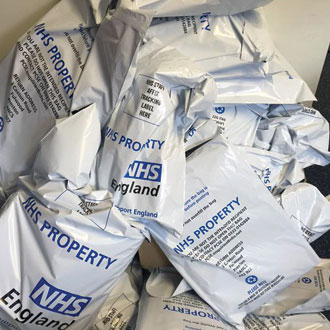
Capita – SUO – 3×2
The true cost of NHS managers’ bid to save money by contracting Capita to carry out support services for GP practices is now becoming clear.
The scheme has led to confusion, with some practices forced to buy their own clinical supplies in order to continue running patient clinics and others facing missing payments.
The Information Commissioner’s Office is now looking into complaints from GPs that patient records have gone missing since Capita took over.
Capita has come under fire from NHS England, the GPC and grassroots GPs for the problems.
The GPC has accused the company of being ‘considerably underprepared for the level of work and resource required for the rollout’, saying this has led to ‘significant delays’, ‘increased workload, disruption and expense to practices’.
In a letter to NHS England, the GPC demanded that practices be recompensed for the disruption.
Meanwhile, NHS England itself has weighed in, telling Pulse that Capita needs to ‘swiftly…deal with these transition issues’, and vowing it ‘will be holding the vendor to account’.
But it also defended the decision to cut costs by outsourcing support services from local offices to Capita’s three national hubs, saying this has ‘freed up tens of millions of pounds’.
We have been contacted by more practice managers on this than anything we’ve ever had
GPC deputy chair Dr Richard Vautrey
Most worryingly for practices, it looks likely that the response to these problems will be a familiar one – shifting more responsibility onto practices.
NHS England had already been warned of the potential problems of outsourcing the support service and attempts to cut costs when it first announced the tendering process in July 2014.
At the time, GPC contracts and regulation subcommittee chair Dr Robert Morley said: ‘The portents are absolutely horrendous for general practice, I’m afraid… there’s nothing at all that reassures me this isn’t going to be an absolute bloody disaster.’
If early indications are anything to go by, it looks as though Dr Morley’s worst fears may be realised.
The GPC’s letter to NHS England detailed a litany of these problems: reports of more than 200 records being stored in practice reception areas for weeks; disruption to services due to a failure in the provision of medical supplies such as syringes and needles; and practice staff left waiting more than half an hour for an urgent phone call to be answered by Capita customer services, and receiving no reply to emails ‘for days’.
The letter also highlighted general dissatisfaction among practices in relation to payments, management of the performers list, support for NHS England local area teams, confusion over claims, and problems associated with pension payments.
Breakdown
Pulse has revealed the details behind the issues with Primary Care Support England (PCSE), the arm of Capita set up to deal with the services.
GPs from across the country have told Pulse that the records of patients transferring from one practice to another have been piling up in surgeries, after Capita temporarily ‘paused’ collections – which are contracted out to the CitySprint courier firm – at one point as the system broke down.
This can be particularly problematic for university practices, which have a high turnover of patients.
GPC deputy chair Dr Richard Vautrey says the BMA has ‘been contacted by more practice managers on this issue than anything we’ve ever had’.
One practice said that it continued to hold records that should have been collected five weeks earlier.
Misplaced records
Pulse can also reveal that when the records are picked up, they are sometimes being delivered to the wrong practices.
Peter Harrison, practice manager at the Milton Surgery in Weston-super-Mare, says that in one week he received 26 correct records, but adds: ‘I also received records for two dead patients (one of which was for another surgery in town) and two for very live patients who unfortunately have never had any links with the local area at all and registered with practices far away. And yes, one for a patient actually registered at another local practice.’
Dr Ian Hume, chair of the GPC’s practice finance subcommittee and leading on the support services issue, says the GPC has raised the problem of misplaced patient records with NHS England, although he adds that measures had been taken to resolve this.
He says: ‘We have raised governance issues, and raised that we have heard similar stories about records.
‘Initially there were no containers to put it [notes] in, now they’ve issued CitySprint with containers so you have boxes which can be sealed. So the driver comes in with a sealed box, you fill it up and that’s sealed up so it won’t fall over – rather than the story we had of somebody walking out with a bundle of notes in their hand, who dropped some in the carpark.’
Dr Hume adds that the GPC has been ‘reassured’ that Capita is investigating all reported incidents and ‘many are not as concerning’ as had first been thought.
But Pulse has also learned that the Information Commissioner’s Office is now looking at the process of transferring patient records.
A spokesperson says: ‘The ICO has been made aware of concerns around the process for moving GP patient records within England, and is making enquiries.’
It’s not just patient records that have been affected by the handover. The GPC says that practices are being left short of essential clinical supplies such as prescription pads, needles and blood vials.
Dr Hume says that, in order to avoid having to suspend services, practices have resorted to buying their own supplies.
He says: ‘I have been aware of people who are close to having to cancel clinics. There has clearly been an element of beg, steal or borrow to keep things going.’
NHS England gave practices permission to invoice them for supplies they had ordered themselves before 31 May.
‘That was one of the main themes I raised with NHS England – that some of these issues were impacting on clinical care and clinical safety and that was not acceptable,’ he adds.
Missing payments
Practices have also missed out on payments. Dr Hume, who is also medical secretary for Norfolk and Waveney LMC, says all the GMS practices in Norfolk missed out on the enhanced service payments due in mid-April.
NHS England has apologised and said it would ‘cover costs incurred by practices’ as a result of the non-payment.
But an East Anglia practice manager who wished to remain anonymous said the delay of ‘£8,000 in mid-monthly payments’ was ‘a significant kick in the teeth’ for practices ‘on the brink of financial meltdown’.
Janet Hallam, practice manager at The Student Health Centre in Huddersfield, West Yorkshire, says: ‘The practice has seniority monies outstanding and we are now having to chase PCSE in this regard.’
‘Initial challenges’
A Capita spokesperson said: ‘NHS England asked Capita to transform what was a locally agreed, fragmented primary care support service, to a national standardised system. Our focus has always been to ensure we achieve an efficient, effective and modern service, that reduces the administrative burden on primary care staff.
‘It is inevitable that with such significant structure change there will be initial challenges. However, we have been working closely with NHS England, and are continuing to do so, to ensure the service is delivered at an optimal level.’
A spokesperson for couriers CitySprint said: ‘We are working closely with Capita to introduce a new, secure weekly collection service for medical records for all GP practices across England.’
But Dr Morley warns that the long-term consequences of the problems may be a shifting of responsibility onto practices – which, he says, is a natural repercussion of privatisation.
He says: ‘I’m certainly concerned that it might be a portent of what might be to follow as we move to a completely new era of totally privatised and remote primary care support services.
‘Now there are no named people – they are anonymous. Telephone calls go unanswered and lots of practice manager time is spent chasing up. Emails and phone calls don’t get replies, and when they do it’s anonymous. It’s a bloody mess.’
What to do if you are experiencing problems
- First point of call is Primary Care Support England’s online help page: pcse.england.nhs.uk/help/

stacked nhs bags 330×330
Related Articles


















